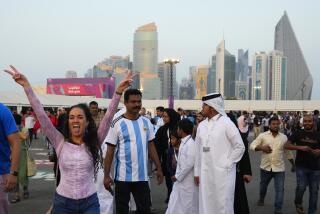Kuwait Keeping a Close Eye on Its Oil Fields
- Share via
RATQA OIL FIELD, Kuwait — Standing next to the barbed-wire fence that separates his country from Iraq, Ali Muhanna ponders the possibility that Saddam Hussein will again try to set this nation’s oil facilities ablaze.
“He’s drowning, he’s dying. Maybe he will try to do anything he can,” said Muhanna, a supervisor at Kuwait Oil Co. “I hope he doesn’t try to do anything foolish like that. He should just go off and die alone.”
Rumors have swirled in Kuwait for weeks: that Iraqi forces will attack the oil fields with Scud missiles, that saboteurs have targeted the facilities, even that the Iraqi president will destroy his own country’s wells near the border, knowing that the sickly black smoke would cover this nation.
To make sure there is no repeat of the 1991 Persian Gulf War inferno, when retreating Iraqi troops set or fanned more than 650 oil field fires, Kuwait in recent days has stepped up protection at pumping and gathering stations, which provide the lifeblood of the country’s economy. Troops are stationed near all oil facilities, and monitoring along the border has been increased.
And starting Saturday, the access of ordinary citizens to the northern half of Kuwait, already limited, became further restricted. Even oil company employees who have been working in the fields for years are now being scrutinized by security forces before being issued passes to enter the zone. Any Kuwaitis camping in the desert -- a common form of recreation -- have been ordered to leave or risk arrest.
The crackdown comes amid reports, labeled credible by Kuwaiti officials, of possible terrorism in the oil fields. The facilities are spread throughout the country, including south of the capital, Kuwait City, and in the “neutral zone” along the border with Saudi Arabia.
But it is here in the Ratqa oil field northwest of Kuwait City that concern is the highest.
Oil operations in this northern region have long been a hot spot in relations between Kuwait and Iraq. One pretense for Hussein’s invasion of this nation in August 1990 was that the Kuwaitis were draining oil from his side of the border using horizontal drilling, “stealing” $3 billion worth a year.
“That’s a lie,” Muhanna said. “We drill on our side, he drills on his side.”
After a U.S.-led coalition routed the Iraqi army in 1991, a demarcation line drawn by the United Nations put 11 oil wells that had been under Iraqi control inside Kuwait. That fact reportedly galls Hussein, who is said to mention it frequently when discussing the United States and the world body.
The two sides are tapping into the same immense reservoir of oil. Geologists have determined that the Ratqa field, once thought to be separate, is the southern extension of Iraq’s giant Rumaila field, which helps give Baghdad the second-largest oil reserves in the world, behind Saudi Arabia.
The Ratqa wells, and others in northern Kuwait, are only a portion of the nation’s production. Most of the approximately 95 billion barrels in proven reserves are in the Greater Burgan area south of Kuwait City, close to the Persian Gulf.
Kuwaiti officials are determined not to reduce production anywhere in the nation even if war breaks out. The nation, which has roughly 9% of the world’s reserves, depends on oil for 95% of its export earnings.
Early this month, the deputy chairman of Kuwait Oil Tanker Co. said the nation will continue to ship crude even if war breaks out and insurance rates soar. U.S. and allied warships are in the Persian Gulf to protect tankers.
Kuwaitis retain a sense of outrage at Hussein’s 1991 order to destroy their fields even though Iraq had lost the war and the destruction served no military purpose. The Iraqis also buried land mines to kill workers trying to fight the blazes.
It took eight months to put out all the fires and two years to clear most of the debris. Some of the burned oil tanks and refining equipment have been left intact as a reminder of the last act of Iraq’s seven-month occupation.
Although access to the fields is tightly controlled, Kuwaiti officials are eager to show foreign journalists the remains of the damage, such as at Gathering Center 26 near Ratqa.
Once a thriving treatment plant, the center is now a collection of broken, burned and twisted metal wreckage. After the war, Kuwait Oil Co. decided to pipe the crude oil to refineries closer to the gulf.
“It is very sad,” said Sarrah Abad, a company official. “We won’t let it happen again.”
More to Read
Sign up for Essential California
The most important California stories and recommendations in your inbox every morning.
You may occasionally receive promotional content from the Los Angeles Times.













